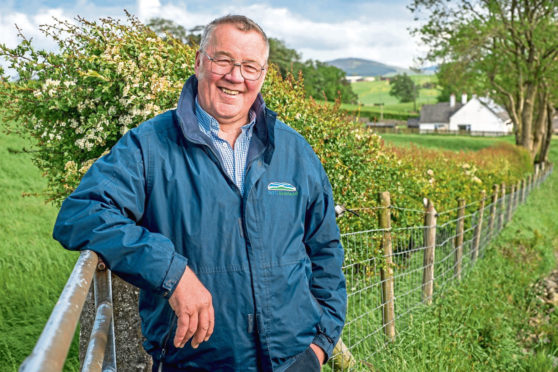The outgoing president of NFU Scotland (NFUS) has urged the Scottish Government to develop a future policy roadmap for the sector.
Dumfries farmer Andrew McCornick also urged government not to “rob Peter to pay Paul” when developing future farm support schemes.
Mr McCornick made the comments in his final address as president at the union’s virtual conference yesterday. He is set to be replaced in the role by Aberfeldy farmer and current vice-president Martin Kennedy at virtual NFU Scotland elections today.
Addressing farmers and crofters across Scotland virtually, Mr McCornick applauded Scottish Government efforts to get Common Agricultural Policy (Cap) support money out as soon as possible but said clarity on future policy was lacking.
“Give Scottish agriculture a policy roadmap now, so that we know how to build the path to deliver profitable and sustainable crofting and farming while meeting all the ambitious targets,” Mr McCornick said.
He urged the Scottish Government to show caution and said he was seeing a “worrying trend” in how it perceives the farming industry.
“No one can deny that our upland and marginal land needs support, but this should not be to the detriment and disregard of those farmers who look after our Region One land, or on the better in-bye land on our upland farms and crofts,” Mr McCornick added.
He said better land, which is designated as Region One in the government’s three-region approach to issuing Basic Payment Scheme (BPS) payments under the Cap, was a massive driver for the rural and national economy.
“A ‘robbing Peter to pay Paul’ policy, which the government has shown with its distribution of convergence monies and the bias in the recent Capital Grant Scheme, has failed to recognise the importance of Region One land to the fortunes of the whole agricultural sector in Scotland,” Mr McCornick added.
He was referring to the use of convergence funding – money originally allocated to the UK to bring Scotland’s per hectare subsidy payments in line with the EU average but not issued in full to Scotland at the time – to top up a shortfall in the Less Favoured Area Support Scheme (LFASS) budget.
The move was widely criticised by NFUS, which said it was short-changing all farmers to the tune of £33m as the funds were designed to top-up BPS payments, and not the LFASS budget.
Mr McCornick yesterday warned failure to fully support Region One land would put Scottish farmers at a disadvantage to their European counterparts continuing to receive support under the Cap via the BPS payments model.
“To have our Region One land starved of support and yet having to meet the same challenges and costs as our strongest, nearest and fully supported competitors would be ruinous for arable, dairy, and similar high-input, low-margin businesses that are located on our Region One land in Scotland,” Mr McCornick said.
“This scenario is wholly unacceptable.”
He also used his final address as NFUS president to urge farmers and crofters to embrace their role in tackling climate change.
“Our industry is ready to stand up and be counted in a green recovery,” added Mr McCornick.
“We are part of the solution.”
